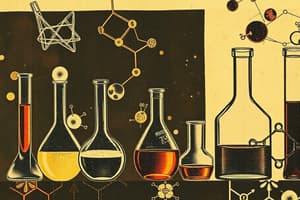Podcast
Questions and Answers
In which type of reaction does a halogen atom get added to the double bond of an alkene?
In which type of reaction does a halogen atom get added to the double bond of an alkene?
- Oxidation Reaction
- Elimination Reaction
- Electrophilic Addition
- Halohydrin Formation (correct)
What is the common type of reaction where an electrophile adds across the double bond of an alkene?
What is the common type of reaction where an electrophile adds across the double bond of an alkene?
- Oxidation Reaction
- Halohydrin Formation
- Elimination Reaction
- Electrophilic Addition (correct)
Which type of reaction typically occurs from the less substituted carbon of the double bond in alkenes?
Which type of reaction typically occurs from the less substituted carbon of the double bond in alkenes?
- Elimination Reaction
- Addition Reaction
- Oxidation Reaction
- Electrophilic Addition (correct)
What are the major reactions of alkenes that this article focuses on?
What are the major reactions of alkenes that this article focuses on?
Which class of organic compounds contain one or more carbon-carbon double bonds?
Which class of organic compounds contain one or more carbon-carbon double bonds?
What helps in activating the double bond by binding to the pi-electrons in electrophilic addition reactions?
What helps in activating the double bond by binding to the pi-electrons in electrophilic addition reactions?
What is the main difference between hydration and hydrogenation reactions?
What is the main difference between hydration and hydrogenation reactions?
What is required for catalyzing electrophilic hydration reactions?
What is required for catalyzing electrophilic hydration reactions?
What type of reaction is dehydrohalogenation?
What type of reaction is dehydrohalogenation?
How are alkenes converted into functional groups in oxidation reactions?
How are alkenes converted into functional groups in oxidation reactions?
Which process involves the removal of water from an alcohol to form an alkene?
Which process involves the removal of water from an alcohol to form an alkene?
What is the role of Lewis acids in synthesizing alkenes?
What is the role of Lewis acids in synthesizing alkenes?
Flashcards are hidden until you start studying
Study Notes
Alkenes Reactions
Alkenes, also known as olefins, are hydrocarbons that contain one or more carbon-carbon double bonds. They are a significant class of organic compounds that undergo various reactions, including addition reactions, elimination reactions, and other transformations. In this article, we will explore the major reactions of alkenes, focusing on their addition and elimination reactions, as well as their synthesis and oxidation.
Addition Reactions
Addition reactions involve the addition of a reagent across the double bond of an alkene, resulting in the formation of a new carbon-carbon bond. These reactions are stereoselective, with the addition typically occurring from the less substituted carbon of the double bond.
Electrophilic Addition
Electrophilic addition is a common type of addition reaction in which an electrophile adds across the double bond of an alkene. This process is often facilitated by Lewis acids, which can activate the double bond by binding to the pi-electrons. The resulting complex can then be attacked by a nucleophile to form an addition product.
Halohydrin Formation
Halohydrin formation is a specific type of electrophilic addition reaction in which a halogen atom is added to the double bond of an alkene, followed by the addition of water across the newly formed carbon-halogen bond. This reaction is often facilitated by the use of halogenating agents like halogens (Cl2, Br2) and N-bromosuccinimide (NBS).
Hydration
Hydration is another type of addition reaction, in which water adds across the double bond of an alkene. This reaction can be facilitated by electrophilic hydration, which involves the use of strong acids like sulfuric or phosphoric acid as catalysts.
Hydrogenation
Hydrogenation is the process of adding hydrogen to a carbon-carbon double bond, resulting in the formation of a single bond. This reaction is typically carried out in the presence of a precious metal catalyst, such as palladium or platinum, and involves the breaking of the double bond and the H-H bond.
Elimination Reactions
Elimination reactions involve the removal of two atoms from adjacent positions in a molecule, resulting in the formation of a multiple bond.
Dehydrohalogenation
Dehydrohalogenation is an elimination reaction in which a halogen atom and a hydrogen atom are removed from adjacent positions in an alkyl halide, resulting in the formation of an alkene. This reaction is facilitated by a base, which can abstract a proton from the substrate, allowing the two atoms to leave as a halogen molecule.
Dehydration
Dehydration is another type of elimination reaction in which water is removed from an alcohol, resulting in the formation of an alkene. This reaction can be facilitated by strong acids, which can protonate the alcohol, allowing the two atoms to leave as water.
Synthesis of Alkenes
Alkenes can be synthesized through various reactions, including elimination reactions and oxidation reactions. Some common methods include the use of Lewis acids to facilitate electrophilic addition reactions, the use of strong acids for electrophilic hydration, and the use of strong bases for dehydrohalogenation.
Oxidation of Alkenes
Oxidation reactions can be used to convert alkenes into other functional groups, such as 1,2-diols and carbonyl compounds. These reactions can be facilitated by various oxidizing agents, including ozonolysis, which involves the use of ozone to cleave alkenes into carbonyl compounds.
In conclusion, alkenes undergo a variety of reactions, including addition reactions, elimination reactions, and oxidation reactions. These reactions play a crucial role in the synthesis and transformation of alkenes, which are important components of many natural products and industrial materials.
Studying That Suits You
Use AI to generate personalized quizzes and flashcards to suit your learning preferences.




